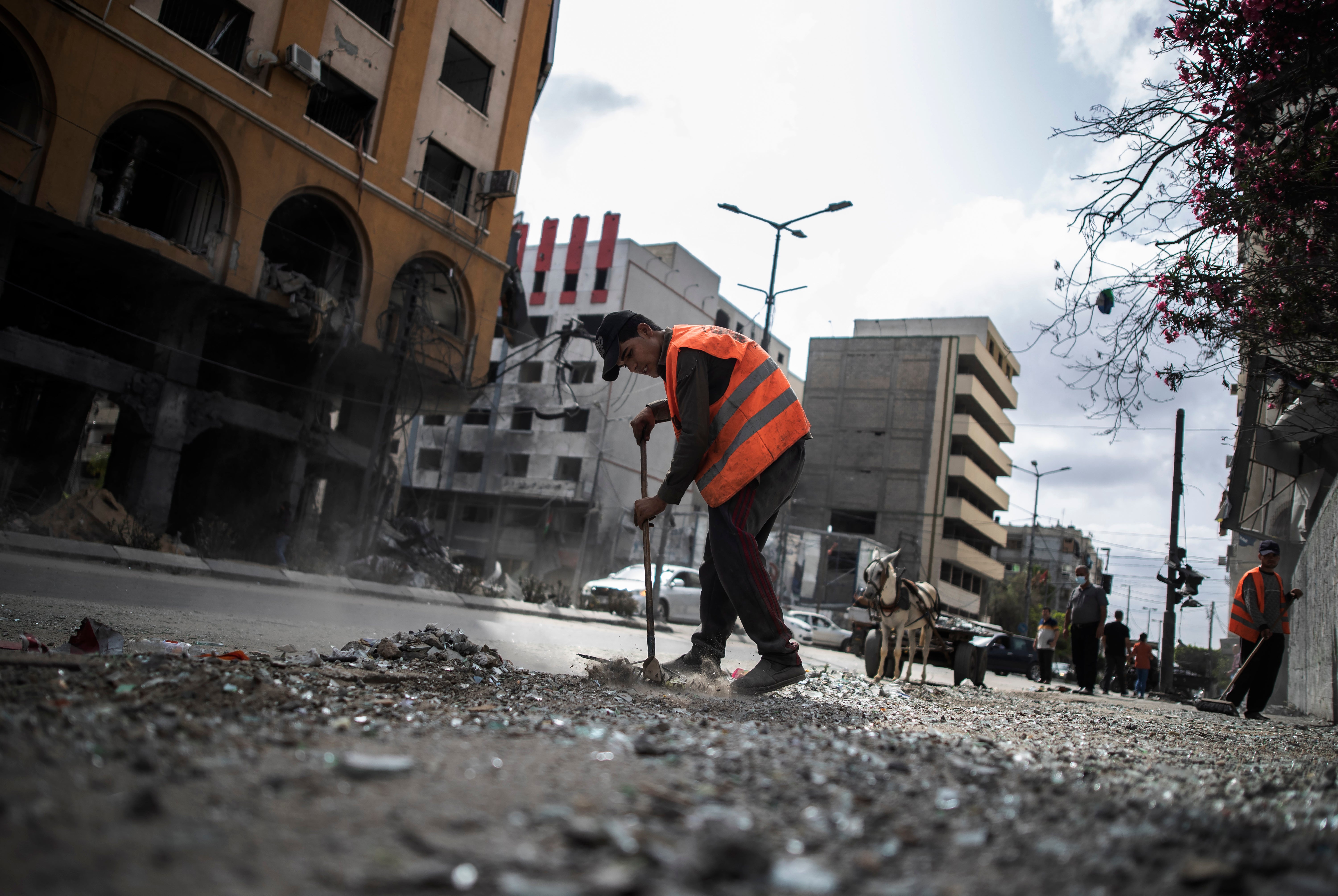EXPLAINER: What was the outcome of the latest Gaza war?
A cease-fire has taken effect after 11 days of heavy fighting between Israel and Gaza’s militant Hamas rulers that was ignited by protests and clashes in Jerusalem

Your support helps us to tell the story
From reproductive rights to climate change to Big Tech, The Independent is on the ground when the story is developing. Whether it's investigating the financials of Elon Musk's pro-Trump PAC or producing our latest documentary, 'The A Word', which shines a light on the American women fighting for reproductive rights, we know how important it is to parse out the facts from the messaging.
At such a critical moment in US history, we need reporters on the ground. Your donation allows us to keep sending journalists to speak to both sides of the story.
The Independent is trusted by Americans across the entire political spectrum. And unlike many other quality news outlets, we choose not to lock Americans out of our reporting and analysis with paywalls. We believe quality journalism should be available to everyone, paid for by those who can afford it.
Your support makes all the difference.A cease-fire took effect Friday after 11 days of heavy fighting between Israel and Gaza s militant Hamas rulers that was ignited by protests and clashes in Jerusalem
Israel carried out hundreds of airstrikes against what it said were militant targets across Gaza, destroying homes and damaging vital infrastructure in the impoverished territory, which has been under a crippling blockade since Hamas seized power there 14 years ago.
Palestinian militants, meanwhile, fired more than 4,000 rockets at Israel, with some reaching as far as Tel Aviv, bringing parts of the country to a standstill.
At least 243 Palestinians were killed, including 66 children and 39 women, with 1,910 people wounded, according to the Gaza Health Ministry. Twelve people in Israel, including a 5-year-old boy and 16-year-old girl, were killed.
Here's a look at what comes next:
___
ANOTHER STALEMATE
Palestinians across Gaza, east Jerusalem and the occupied West Bank celebrated what many saw as a victory by Hamas against a much more powerful Israel. Israeli Prime Minister Benjamin Netanyahu meanwhile faced criticism from his hawkish base, with many accusing him of ending the war prematurely without vanquishing Hamas.
Netanyahu said Israel inflicted major damage on Hamas' military capabilities, killing 200 militants, including 25 senior commanders. He says it struck more than 100 kilometers (60 miles) of militant tunnels as well as rocket launchers and other military infrastructure.
But Israel never managed to stop the rocket fire.
Palestinian militants launched massive rocket barrages that at times seemed to overpower Israel's formidable air defenses. The Israeli military says it had an interception rate of 90% and that hundreds of rockets fell short into Gaza, with one killing a Palestinian family of eight.
___
ANOTHER FRAGILE TRUCE
As with the last three wars, the fighting was ended by an informal cease-fire brokered by Egypt and other mediators, the exact terms of which were not made public.
Hamas claimed that Israel agreed to halt police actions at the flashpoint Al-Aqsa Mosque compound in Jerusalem and the threatened eviction of Palestinian families from the nearby Sheikh Jarrah neighborhood. Both had sparked Palestinian protests and clashes with police that eventually ignited the war. But there was no confirmation from Israel or mediators.
Previous cease-fires have stopped major fighting but proved shaky. Israel and Hamas have fought four wars and exchanged fire countless times since the Islamic militant group seized control of Gaza from forces loyal to the Palestinian Authority in 2007. Scattered clashes at Al-Aqsa after Friday prayers were an early test of the truce's durability.
No cease-fire has addressed the underlying issues fueling the decades-old conflict, including Israel's occupation of lands the Palestinians want for a future state and Hamas' refusal to recognize Israel's right to exist. Israel and the Palestinians have not held substantive peace talks in more than a decade.
___
ANOTHER ISRAELI ELECTION?
Netanyahu's political opponents were on the verge of forming a government and ousting him following four inconclusive elections in two years. But delicate coalition negotiations with Arab parties were put on hold when the fighting erupted.
The war initially seemed to bolster Netanyahu's political prospects, allowing him to present himself as tough leader who was punishing the country's enemies. But since the cease-fire took hold, he has faced renewed criticism.
It was never clear whether Netanyahu's opponents, who span the political spectrum from erstwhile right-wing allies to Arab parties — would be able to set aside their differences to push him out of office. Another election later this year is a distinct possibility.
Israelis have been deeply polarized over Netanyahu in recent years as he has faced allegations of corruption for which he is now on trial. In the months before the war, activists had organized weekly protests outside his residence. Those are now set to resume.
___
ANOTHER US INTERVENTION
The Biden administration, which had hoped to extricate the U.S. from the region's intractable conflicts to focus on a rising China and climate change, was caught flat-footed and has now been dragged back into the dispiriting role of Mideast mediator.
From the start of the latest war, the U.S. repeatedly affirmed Israel's right to defend itself while quietly encouraging cease-fire efforts. On Wednesday, however, President Joe Biden told Netanyahu he wanted to see a “significant de-escalation.”
Netanyahu initially seemed to brush him off, saying he was “determined to continue” the offensive until its objectives were met. But he agreed to the cease-fire the following day.
The exchange marked an early test of the relationship between the two leaders, who have had moments of tension over the years. Biden meanwhile faces domestic pressure from a Democratic base that increasingly sympathizes with the Palestinians.
U.S. Secretary of State Antony Blinken plans to visit the region in the coming days.